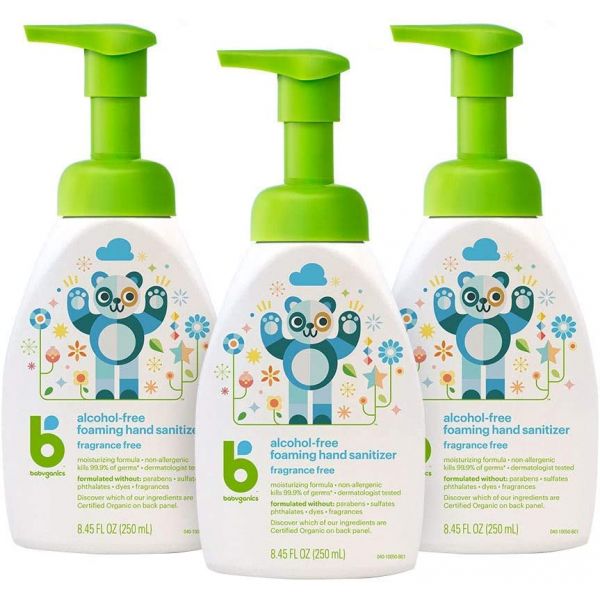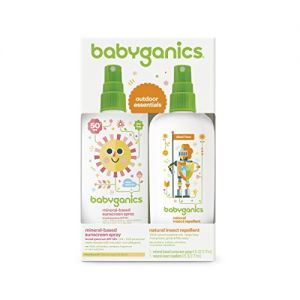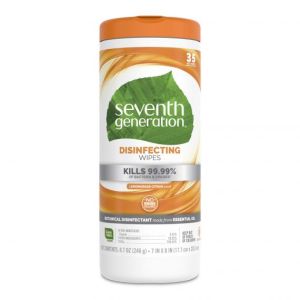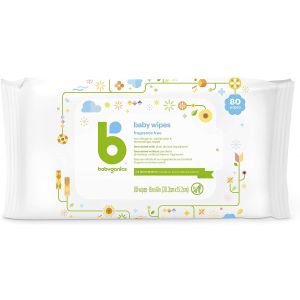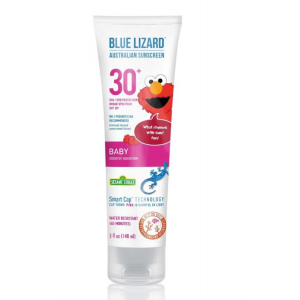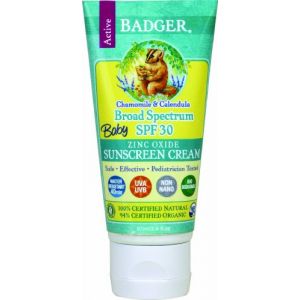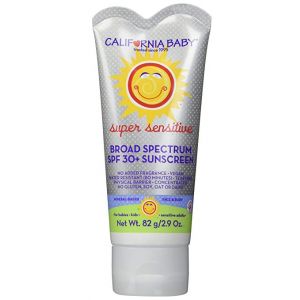Babyganics alcohol-free foaming hand sanitizer
1.69 fl oz
A moisturizing alcohol free foaming hand sanitizer for babies and sensitive skin which kills 99.9% of germs including the covid-19 virus.
Best For
Kills germs on babies hands, face and skin
Ingredients of Concern
benzalkonium chloride 0.1%
- Pros:
- Active ingredient benzalkonium chloride 0.1% kills 99.9% of germs
- Coconut oil moisturizing formula does not dry hands
- Fragrance free
- Formulated without: parabens, sulfates, phthalates, artificial fragrances or dyes
- Non-allergenic - Dermatologist tested
- Tough on germs, gentle on skin
- Batch tested for pH, odor, color ensuring everything checks out contaminant-free
- Rated 2 on EWG which is safe
- A study shows benzalkonium chloride can kill covid-19, but CDC recommends alcohol
Ingredients Concern: Benzalkonium Chloride;Certrimonium Chloride;Laurtrimonium Chloride (although product is rated 3 which is safe overall)
Cons: Not as strong as alcohol or bleach in killing covid 19 (but these ingredients are not as soothing or safe [bleach] for hands anyway)
Takes a bit longer than other sanitizers to dry
Founded by parents whose mission is to raise the next generation of healthy, happy babies. Products and ingredients are thoroughly vetted and tested with the help of pediatricians, dermatologists.
Active ingredient benzalkonium chloride 0.1% kills 99.9% of germs. A recent published study by researchers in Hong Kong who studied the effects of disinfectants on SARS-CoV-2 (the virus that causes covid-19) found benzalkonium chloride and 0.05% chlorhexidine to be effective in killing covid-19. However, Babyganics states that this prioduct is not for covid 19 because it does not contain alcohol.
Kills germs on babies hands, face and skin
Benzalkonium chloride is a non-alcohol-based active ingredient used for clinical, food line, and domestic household chemical agent, that may be applied topically or used as a disinfectant to stop the growth of microorganisms [1]. Studies show the use of antiseptic hand sanitizers decrease the prevalence of the common cold, acute respiratory syndromes, gastroenteritis, and viral influenza. [2,3] . For such preventative measures, there are a variety of hand sanitizers available with alcohol-based and alcohol-free antiseptic agents including ethanol, triclosan and benzalkonium chloride. Recently alcohol-free hand sanitizers with triclosan or benzalkonium chloride have been gaining ground due to concerns that ethanol dries out the skin, is too toxic, and there are frequent cases of intentional ingestion. Additional concerns involve the extensive use of antiseptics risking the selective survival of antiseptic resistant pathogens, which may be simultaneously selecting for antibiotic resistance. This theory of simultaneous or cross-selection suggests that selection of either antiseptic or antibiotic resistance will also select for the other, ultimately resulting in weaker antibacterial therapy and pressure for careful use of both biocides. Despite speculations of evolving resistance mechanisms, BACs are extensively used biocides especially efficacious against enveloped microorganisms.
Key Ingredients: benzalkonium chloride 0.1%
All Ingredients: water, cetrimonium chloride, laurtrimonium chloride, dihydroxyethyl cocamine oxide (coconut oil derived), glycereth-17 cocoate (coconut oil ester and glycerin derived), citric acid
Apply to your baby's hands.
These statements have not been evaluated by the FDA. These products are not intended to diagnose, treat, cure or prevent any disease.
[1] McDonnell, G., and Russell, A.D. 1999. Antiseptics and disinfectants: activity, action, and resistance. Clinical Microbiology Reviews, 12 (1): 147-179. Aiello, A.E., Coulborn, R.M., Perez, V., and Larson, E.L. 2008.
[2]Effect of hand hygiene on infectious disease risk in the community setting. American Journal of Public Health, 98 (8): 1372-1381.
[3] Oxford, J.S., Potter, W., McLaren, C., and Hardy, W. 1971. Inactivation of influenza and other viruses by a mixture of virucidal compounds. American Society for Microbiology, 21 (4): 606-610
[2]Effect of hand hygiene on infectious disease risk in the community setting. American Journal of Public Health, 98 (8): 1372-1381.
[3] Oxford, J.S., Potter, W., McLaren, C., and Hardy, W. 1971. Inactivation of influenza and other viruses by a mixture of virucidal compounds. American Society for Microbiology, 21 (4): 606-610
Write Your Own Review

